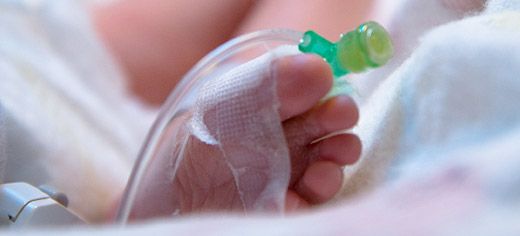
Standards of care in children's intensive care units come under scrutiny in a new audit report published today by the University of Leeds and the University of Leicester.
The report, commissioned by the Healthcare Quality Improvement Partnership and carried out by the Paediatric Intensive Care Audit Network (PICANet) showed that death rates in children's intensive care units are low and continue to fall.
However this national audit found that around two-thirds of children's intensive care units across Britain and Ireland were running without the recommended number of qualified nurses. Just 13 of the 34 units surveyed met the new standards for nursing staff as recommended by the Paediatric Intensive Care Society.
Professor Elizabeth Draper, co-principal investigator of PICANet from the University of Leicester, commented: "Qualified nurse staffing levels have improved over time, with more than three quarters of Paediatric Intensive Care Units meeting the old standard. But following the revision of these standards in line with the recommendations of the Royal College of Nursing, fewer than 40% of units now achieve the required levels of qualified nursing staff."
PICANet collected data from 30 institutions providing paediatric intensive care. They at looked at details of 52,000 admissions to these units of nearly 39,000 individual children aged between 0 and 15 years over a three year period from 2008 to 2010. This included where each child was admitted, their diagnosis and the treatment they received, how long they remained in intensive care and the eventual outcome.
The report showed that overall, the death rate in paediatric intensive care units is continuing to fall, dropping from 4.5% in 2008 to 3.8% in 2010. However, a separate analysis of data from units in England and Wales showed that the mortality rate for children with asthma who required help with their breathing was relatively high compared to other developed countries.
"It is extremely rare for children to die in paediatric intensive care and the majority leave this type of specialist care alive," said Dr Roger Parslow, a senior lecturer at the University of Leeds and co-principal investigator of PICANet. "However, as our work on asthma shows, it is still important for clinical audits, like PICANet, to work with doctors and nurses by monitoring performance and clinical outcomes to help them provide the best quality of care to children in paediatric intensive care units."
"It is concerning that the death rate in England and Wales for asthma admissions to paediatric intensive care units is relatively high compared to other developed countries. The PICANet data has been very useful in highlighting this issue but it cannot identify why this is the case and what can be done about it," said Dr Andrew Durward, from Evelina Children's Hospital in London, who co-led the analysis of asthma data.
A snap-shot survey of staffing levels across the institutions also highlighted the mismatch between standards set by the Paediatric Intensive Care Society and the situation on the ground. Only 38% of institutions met the recommended ratio of nursing staff to children's intensive care beds.
The eighth annual report from PICANet on activity and outcome in paediatric intensive care services throughout the UK and Ireland is available to download free from here: http://www.picanet.org.uk/.
A National Review of Asthma Deaths has been commissioned by the Health Quality Improvement Partnership (HQIP).
PICANet has been collecting data on all admissions to paediatric intensive care in England and Wales from 2002 and has expanded to include Scotland, Northern Ireland and Southern Ireland. It currently holds data on over 120,000 admissions. The information held on the PICANet database has been used by the Department of Health, strategic health authorities, commissioners, clinical audit teams, researchers and individual institutions to improve the delivery of paediatric intensive care.
For more information:
Contact: University of Leeds Communications & Press Office: Tel 0113 343 4031, email pressoffice@leeds.ac.uk
Contact: Ather Mirza, University of Leicester Press Office: Tel 0116 252 3335, email: pressoffice@le.ac.uk